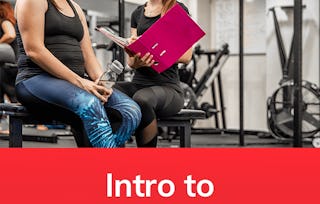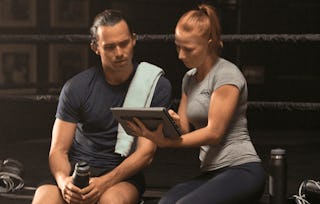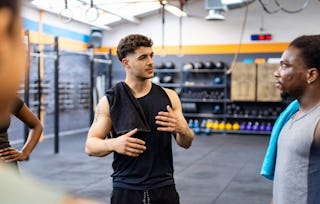In this course, you will learn foundational knowledge of the fitness industry and how to begin training clients. It will provide the groundwork and essential skills you will use to progress in your career, as well as gain an understanding of the industry and the role of a personal fitness trainer. You will also learn how to conduct and interpret fitness assessments, which are essential tools for personal trainers to evaluate their clients' fitness levels and design customized training plans. Additionally, you will learn how to apply health screenings and their results in a fitness setting. This knowledge will enable you to identify any potential health risks or limitations that may impact your client’s ability to safely participate in physical activity. By understanding how to apply health screenings and interpret their results, you will be able to design safe and effective fitness programs that meet the unique needs of each client.

Getting Started as a Personal Fitness Trainer
Ends soon: Gain next-level skills with Coursera Plus for $199 (regularly $399). Save now.

Getting Started as a Personal Fitness Trainer
This course is part of NASM Personal Fitness Trainer Professional Certificate

Instructor: Casey DeJong
24,385 already enrolled
Included with
(203 reviews)
Recommended experience
What you'll learn
Identifying the components and purposes of fitness assessments.
Evaluating client information to inform individualized training programs.
Differentiating between the roles and limitations of fitness professionals and healthcare providers.
Skills you'll gain
Details to know

Add to your LinkedIn profile
See how employees at top companies are mastering in-demand skills

Build your Basic Science expertise
- Learn new concepts from industry experts
- Gain a foundational understanding of a subject or tool
- Develop job-relevant skills with hands-on projects
- Earn a shareable career certificate from National Academy of Sports Medicine

There are 5 modules in this course
The need for society to be proactive in preventive medicine has perpetuated a strong focus on exercise in recent years. Although it seems like nothing new, exercise has gained some acceptance in society as a viable means to increase quality of life and life expectancy. However, implementing exercise in daily life is met with hesitation and avoidance. Much of this is attributed to the lack of knowledge of exercise applications and benefits in the general population. Upon completion of this week’s lessons, the aspiring fitness professional will be able to:
What's included
6 videos9 readings6 assignments2 plugins
Nearly everyone understands the benefits of a healthy lifestyle. However, the typical lifestyle does little to provide the human body with what it needs to maintain proper health. As previously stated, the wealth of technology and automation in the United States has begun to take a toll on public health. Technology advancements have greatly reduced the need for physical exertion in daily life. For that reason, fitness professionals have a great opportunity to connect with clients and help them change their lives for the better! Upon completion of this week’s lessons, the aspiring fitness professional will be able to:
What's included
8 videos7 readings6 assignments5 plugins
Designing an individualized, systematic, integrated fitness assessment can be properly accomplished only by understanding a client’s goals, needs, and abilities. This entails knowing what a client wants to gain from a training program, what a client needs from a program to successfully accomplish their goal(s), and how capable they are of performing the required tasks within an integrated program. The information necessary to create the right program for an individual comes from a proper fitness assessment. Upon completion of this week’s lessons, the prospective fitness professional will be able to:
What's included
7 videos8 readings7 assignments
After discussions of lifestyle and medical history are performed to gather subjective information about a client, it is time to get into the gym and perform objective fitness assessments in order to paint the clearest picture of a client’s fitness needs. These include physiological assessments, body-composition assessments, postural assessments, cardiorespiratory assessments, and muscular endurance and strength assessments. Upon completion of this week’s lessons, the prospective fitness professional will be able to:
What's included
7 videos9 readings8 assignments
The final quiz is designed to assess your understanding and mastery of the key concepts covered throughout the course. It will include questions from all the major topics discussed in Weeks 1 to 4, ensuring that you have a solid grasp of the principles and practices of personal fitness training. The final peer-reviewed assignment aims to assess your practical skills in evaluating client information, designing individualized fitness programs, and addressing client-specific needs and motivations. By completing this assignment, you will demonstrate your ability to conduct comprehensive fitness assessments, develop personalized training programs, and construct SMART goals for clients.
What's included
1 assignment1 peer review
Earn a career certificate
Add this credential to your LinkedIn profile, resume, or CV. Share it on social media and in your performance review.
Instructor

Offered by
Explore more from Basic Science
 Status: Free Trial
Status: Free TrialNational Academy of Sports Medicine
 Status: Free Trial
Status: Free TrialAmerican Council on Exercise
 Status: Free Trial
Status: Free TrialNational Academy of Sports Medicine
 Status: Free Trial
Status: Free TrialAmerican Council on Exercise
Why people choose Coursera for their career




Learner reviews
203 reviews
- 5 stars
82.26%
- 4 stars
12.31%
- 3 stars
1.47%
- 2 stars
0.98%
- 1 star
2.95%
Showing 3 of 203
Reviewed on Jan 17, 2026
Excellent program, for people interested I would highly recommend it as its a perfect introduction to this world of being a Personal Fitness Trainer, it gives you all the basics.
Reviewed on Dec 24, 2025
This is a very good course for everyone that want consider having career as fitness trainer.
Reviewed on Mar 3, 2025
Honestly speaking this course is a lit!! from basic to advance u go thoroughly, loved it,
Frequently asked questions
To access the course materials, assignments and to earn a Certificate, you will need to purchase the Certificate experience when you enroll in a course. You can try a Free Trial instead, or apply for Financial Aid. The course may offer 'Full Course, No Certificate' instead. This option lets you see all course materials, submit required assessments, and get a final grade. This also means that you will not be able to purchase a Certificate experience.
When you enroll in the course, you get access to all of the courses in the Certificate, and you earn a certificate when you complete the work. Your electronic Certificate will be added to your Accomplishments page - from there, you can print your Certificate or add it to your LinkedIn profile.
More questions
Financial aid available,
¹ Some assignments in this course are AI-graded. For these assignments, your data will be used in accordance with Coursera's Privacy Notice.





